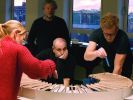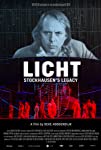Eye For Film >> Movies >> Licht - Stockhausen’s Legacy (2022) Film Review
Licht - Stockhausen’s Legacy
Reviewed by: Andrew Robertson

Licht takes its name from its subject's magnum opus, an opera whose 29 hours or so are intended to be performed in a succession of venues. The documentary is rooted in a presentation of a truncated form of the work, Aus Licht. Licht is subtitled the Legacy Of Stockhausen and its eponymous work is subtitled Die Sieben Tage Der Woche. The seven operas each named for a day were written in overlapping parts between 1977 and 2003. It's an astonishing idea, one whose scale and scope and venue (a converted gas-holder in Amsterdam) and, indeed, degree of obsession are reminiscent of works of fictive creativity like Synechdoche, New York.
I must admit to spending much of Licht both lost and astonished. Like many with a fondness for electronic music I am aware of Karlheinz, of his works' complexity, but I did not know how similarly convoluted and mannered his personal life was. I knew of an intended work where a string quartet performed remotely, each in their own helicopter, but it was something else to see rehearsals in four rooms of a conservatoire, to see four Eurocopter/Airbus H120/EC120B Colibri "Hummingbird" take off with their musicians clad in what appeared to be rave-bound muppet-pelt jackets.

The word I came back to was devotion. Oeke Hoogendijk has several documentaries to her name, including one about owners of Rembrandts and a pair about the Rijksmuseum. The staging of Aus Licht offers a throughline for this story about Stockhausen but it is in interviews with his extended (and complicated) family that there's a deeper sense of the man, if not his art. I ended up drawing a family tree to try to keep track of the two ex-wives, the two widows, the count of children who participated was further complicated by a note deep within the credits that one more was willing to participate but film scheduling did not allow. Over a production that includes biannual rehearsals for Aus Licht, staged in 2019, for a film released in 2022 that (like much else) raises further questions.
Devotion, though - everywhere. Cult-like, even, the dedication to properly staging a partial staging is incredible. There are the patrons, the fundraisers, the survivors, the families, details of score and performance and the conflicts between interpreters of will (and potentially Will) are everywhere. The resources deployed are staggering, an industrial building turned into a temple of music. There are dozens of operators of that helicopter, but those with the wherewithal to put four in the air at the same time are usually limited to state level actors like air or national police forces.
In service of an idea, of replacing the resonances of the other three of a quartet through a single instrument with the mixture of radio and rotation of the engines and the rotors. First staged with four Alouette (Lark) helicopters in the early Nineties, that platform's turboshaft engine is replaced in the Airbus/Eurocopter by a very similar one but elsewhere structures like fenestrons and aerodynamic fairings potentially tamper with timbre in ways unforseen. The resonance of cello and helicopter is not a new one, the idea apparently came in a dream though Apocalypse Now predates it by some distance. No matter the revelation it's a striking idea, more so in the execution.
A polylingual multinational coproduction is fitting for a film where archive includes the man himself in hat and coat striding through woodland like some minor duke, not the figure who some would call "papa techno". A recurring framing uses depth of field to show us vast or complex spaces behind those being interviewed. Sometimes it rotates with shades of Bayhem but at others it is the stark white-washed walls of rehearsal rooms, the similarly still monochrome of Apple laptops, the empty space of gas-holders not yet filled with staging and audiences, the woods in winter, the laser-cut spars of an architectural model.
There's a bit of archive of Stockhausen himself that is similarly framed, an approach to camera, a recitation. Paralleled and reflected in composition and, by extention, performance of that composition. Tone is set early. A question, "What is about?" is given time and space to not be answered. There is a constant tension here, music and sound abound. At one point there is within an interview the sound of a distant jet, and that might be the only accidental entity where control is so often displayed. I believe there may be just one musical piece not by the Stockhausens, a Vivaldi piece performed by, I think, the Moscow Philharmonic. Elsewhere in the extensive musical credits compositions are named and numbered, Herbstmusik (40) by the Yxus Ensemble one of scores.
In and among the notes is an almost religious set of disputes. Aus Licht serves as an opportunity for diffracting views, for opinions to grate upon one another. Some of the opportunities for schismatic thought are prismatic, directional, others pragmatic, operational. Within it though a chorus whose differing interpretations of orthodoxy have them seeming to operate off a different calendar, even with the passages of time marked off in coloured blocks in Excel spreadsheets printed off in A3. Composer and director are often in opposition but here the choreography isn't solely in the intentional tension. So sweeping are the texts at root that it seems that the confessional is more like Schrodinger's box. In interview and observation fealty is pledged to a particle in Avignon or a wave in Rome.
Licht is a document of brutal honesty. At Edinburgh's 2022 Film Festival it was prefaced by a content warning for self-harm, and it is otherwise far from an easy watch. Karlheinz himself is compared to the sun, reflections around that brilliance can't and don't hide the damage that brilliance can do. That centrality (all Copernicans here) is graven and gravity. The monstrous platen of the ritual space of his grave, awaiting his attendants. The martial nonsenses of the trumpeters with their holsters of mutes. The comic timing of his lecture about the consequences of his experiments at the Osaka World's Fair. Later brass-musicians are clad as riot-police to chasten the betrayers. In a tale full of sweeping religiousities there are also castings out, heretics and banishment. There is in Hoogendijk's camera a constant balance of focus and depth, but wide-eyed this does not perhaps serve as guide as much as spectacle.
I knew things I did not know, and was captivated in their telling, and that is measure enough for documentary. I was left wanting to know more, to try to understand, having been given for a moment a place to try and reach it. I think of statements made within the film, "the sun just pours out", "we are no longer running through the woods", "finally we are back into art", "it doesn't make any sense". I am not sure, after two hours, I was any wiser.
Though literally focused the film takes time where it feels fit. "Many" is repeated to musicality, we watch a question go unanswered over several attempts. There are dinner parties and disputes, family memories and more. It takes its time and does not feel long enough, and the split between coverage of Aus Licht, which is not Licht, and Stockhausen, who is not the only Stockhausen, does not so much leave gaps as shadows. Illuminating, but perhaps not in the manner of solar disinfection but a brief moment of artistic display at the start of rote copy. If nothing else it gives a glimpse of what amounts to a tyrannic majesty. It is unwise to stare at the sun, but what pale shadows can do it justice?
Reviewed on: 24 Aug 2022

















